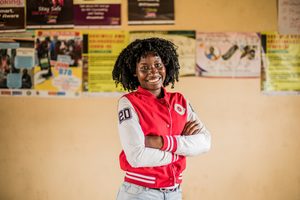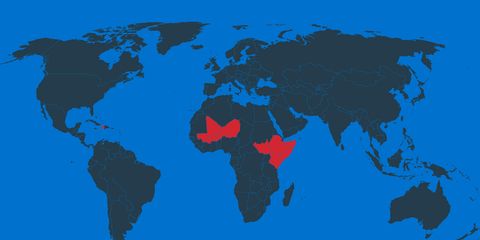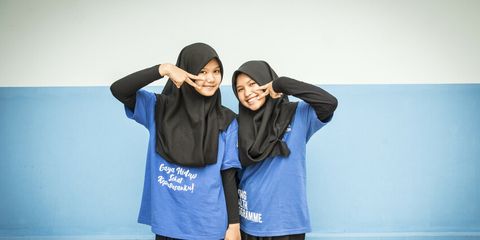The story of 2022 and girls’ rights
<strong>By Plan International CEO Stephen Omollo and Chair Gunvor Kronman.</strong> <br>
4 January 2023This blog about our work supporting girls to learn, lead, decide and thrive accompanies Plan International’s Worldwide Annual Review.
This piece is written by Plan International’s CEO Stephen Omollo, and Chair Gunvor Kronman.

2022 was a year of converging global challenges, including the lingering effects of the COVID-19 pandemic, rising costs of living, an increase in conflict and fragility, and soaring food poverty and hunger worldwide – all worsened by the impact of the climate crisis. These intersecting crises have deepened the inequity girls face daily and threaten to reverse progress made towards equality and justice. This makes the work done by Plan International more important than ever.
This was also the final year of our five-year global strategy, 100 Million Reasons. A strategy with the bold ambition to see 100 million girls learn, lead, decide and thrive. Through the dedication and resilience of our teams and allies, in 2022* we have been able to reach 27.7 million girls with programmes ranging from improving girls’ sexual and reproductive health and rights to education and protection in emergencies.
Our focus on girls’ rights
The 100 Million Reasons strategy launched Plan International’s focus on six priority areas of work: inclusive, quality education; skills and decent work; young people driving change; sexual and reproductive health and rights; early childhood development; and protection from violence. Across Africa, Asia and the Americas in 2022 this work ranged from the Break Free programme in 9 African countries challenging the attitudes and customs that lead to child marriage; to working with communities in the Philippines to identify and support very young children at risk of developmental delay or disability; to delivering classes in robotic coding to girls in China.
To keep up with a fast-changing world, Plan International, and indeed the entire humanitarian and development sector, has been forced to adapt. We have been challenging our existing ways of working and creating new approaches to achieve maximum impact. In preparing our next strategy, to ensure we were building on our strengths and experience, and listening to those closest to our work, we engaged thousands of staff, partners, girls and young people to contribute. The outcome is a bold, refreshed global strategy which will guide us towards our ambition to 2027, to see All Girls Standing Strong Creating Global Change.
Responding for girls in crisis
One realisation which emerged through our strategy development was we must scale up our humanitarian response work. In 2022, 274 million people were estimated to need humanitarian assistance and protection, a significant increase from 235 million people the year before, itself the highest figure in decades.
Together with our partners, with boys and men, and with local communities we will break down the barriers and discrimination that girls face and help shift the power towards achieving gender equality.
As more girls are exposed to the impacts of emergencies, we work to address both the immediate challenges to girls’ rights and the longer-term issues of gender inequality that are exacerbated in a crisis. Our portfolio of humanitarian responses is evolving consciously and tactically in response to these challenges. For example, school feeding programmes which are critical to help keep children in school were implemented in 15 countries; while our fast-expanding cash and voucher assistance programming reached 26 countries. Cash and voucher assistance is safe and cost-efficient, fast to distribute in emergencies and enables our programme participants to choose their goods and services.
We started operations for the first time in Poland, Romania, Moldova and Ukraine in response to the conflict which has displaced more than 6 million people. In our 85th year since being founded, this was a painful reminder of our roots as an organisation created in response to the plight of displaced young people during the Spanish Civil War. Our work in Eastern Europe, building on strong local partnerships, has focused primarily on child protection, education, and the provision of mental health and psychosocial support services to refugees. Our activities reached more than 165,000 individuals across the four countries from March to end-June 2022.
Confronting the hunger emergency
The conflict in Ukraine continues to have global consequences, driving up the cost of wheat and grains. Combined with the devastating effects of climate change on agriculture and food production, this has created a global hunger crisis on an unimaginable scale: almost 50 million people on the brink of famine in 45 countries alone.
Children – especially girls – bear the brunt of this crisis, with around 45 million children under the age of five suffering from severe weight loss known as wasting. The reality is when food runs low, girls are often the first to be taken out of school, and the last to eat and the impacts go far beyond daily hunger. In some of the world’s worst hunger hotspots, families may resort to early and forced child marriage for their daughters, simply to survive. Hunger also places girls at greater risk of gender-based violence, sexual exploitation and unwanted pregnancy.
In response, in June 2022, Plan International declared a Red Level Alert for the Global Hunger Crisis. A Red Alert requires all parts of our global organisation to work together to address critical needs. The alert focused our work in Burkina Faso, Ethiopia, Haiti, Kenya, Mali, Niger, Somalia, South Sudan, and scaled up response efforts such as food distribution, cash and voucher assistance, school meals, malnutrition screening and nutrition supplementation.
Working with allies to change policy
Alongside its humanitarian and development operations, Plan International led influencing efforts at local, regional and global levels with some significant successes. Plan International wants to see girls, boys and young people shape decisions that affect their lives by leading change within their own communities and influencing decisions at higher levels. At the global level, at the United Nations’ Generation Equality Forum we worked with Adolescent Girl Investment Plan partners and youth leaders to successfully centre adolescent girls’ rights and voices in the forum’s processes and we made 30 organisational commitments supporting girls’ leadership. These included launching the Girls’ Fund in partnership with Purposeful, with funding from the Government of Ireland to resource girl activists and their organisations over 5 years.
A core area of our work is ensuring that children, particularly girls, have the education they need to succeed in life and help to overcome discrimination they face. This also includes having the skills and knowledge to adapt to the impacts of climate change. The #EducationShiftsPower initiative, in partnership with Transform Education, aimed to secure important global commitments to education that advances gender equality and climate change adaptation. We sought to influence outcomes of the education financing event the Global Partnership for Education’s Replenishment Summit and COP26 (and earlier, the G7). Some notable results included political commitments from donor governments and lower-income countries on girls’ education, and specific commitments from Cameroon, Chad, Guinea, Malawi, Niger, Pakistan and Tanzania.
At COP26 we also launched our Adolescent Girls in the Climate Crisis research led by young women researchers from Zambia and Zimbabwe who presented their findings at a high-level event. The actions recommended by girls in the research are now being implemented at local level.
Standing up for truth online
The global Girls Get Equal campaign demands equal power, freedom and representation for girls and young women. Our #FreeToBeOnline campaign launched on International Day of the Girl focused on online misinformation and disinformation and the impact on girls. The State of the World’s Girls Report, The Truth Gap, analysed how adolescent girls deal with misinformation online, surveying 26,000 girls and young women from 26 countries. A global petition calling on national governments to educate children in digital literacy to combat the spread of false information online, collected 49,524 signatures from 149 countries. From Cameroon, Zambia and the Philippines to Peru, authorities have made various promising commitments, including to develop a charter for the protection of Children Online and programmes in schools to enhance digital media literacy.
We give our warmest thanks to the heartbeat of our organisation, our dedicated staff, our unwavering partners, supporters, child sponsors and the young people we work with for their commitment to the rights of children, and their drive to stand with girls in the face of historic discrimination and new and evolving crises. Our work would not be possible without their resilience and determination.
As Plan International looks to the future, fuelled by our new global strategy, we aim to improve the lives of 200 million girls in the next five years. We know from experience that when girls thrive in a more equal world, we are all stronger for it. Together with our partners, with boys and men, and with local communities we will break down the barriers and discrimination that girls face and help shift the power towards achieving gender equality. The time is now. Together, we will be led by girls, for girls.
*The year under review runs from July 2021 to June 2022.

